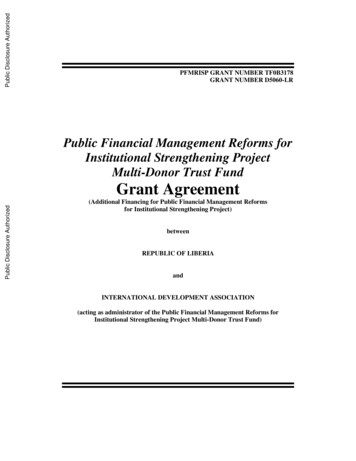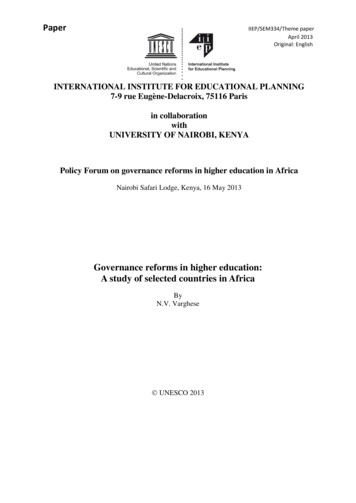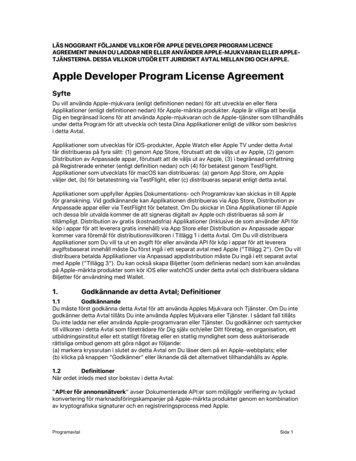
Transcription
Public Disclosure AuthorizedPublic Disclosure AuthorizedPublic Disclosure AuthorizedPFMRISP GRANT NUMBER TF0B3178GRANT NUMBER D5060-LRPublic Financial Management Reforms forInstitutional Strengthening ProjectMulti-Donor Trust FundGrant Agreement(Additional Financing for Public Financial Management Reformsfor Institutional Strengthening Project)betweenREPUBLIC OF LIBERIAandPublic Disclosure AuthorizedINTERNATIONAL DEVELOPMENT ASSOCIATION(acting as administrator of the Public Financial Management Reforms forInstitutional Strengthening Project Multi-Donor Trust Fund)
PFMRISP GRANT NUMBER TF0B3178PUBLIC FINANCIAL MANAGEMENT REFORMS FOR INSTITUTIONALSTRENGTHENING PROJECT MULTI-DONOR TRUST FUNDGRANT AGREEMENTAGREEMENT dated as of the Signature Date between REPUBLIC OF LIBERIA(“Recipient”) and INTERNATIONAL DEVELOPMENT ASSOCIATION (“Bank”),acting as administrator of the Public Financial Management Reforms for InstitutionalStrengthening Project Multi-Donor Trust Fund for the purpose of providing additionalfinancing for activities related to the Original Project (as defined in the Appendix to thisAgreement).The Recipient and the Bank hereby agree as follows:Article IStandard Conditions; Definitions1.01.The Standard Conditions (as defined in the Appendix to this Agreement) apply toand form part of this Agreement.1.02.Unless the context requires otherwise, the capitalized terms used in this Agreementhave the meanings ascribed to them in the Standard Conditions or in the Appendixthis Agreement.Article IIThe Project2.01.The Recipient declares its commitment to the objectives of the project describedin Schedule 1 to this Agreement (“Project”). To this end, the Recipient shall carryout Parts: 1.2(a)(ii), (a)(iii) and (b); 2.1; and 2.3(b) of the Project in accordancewith the provisions of Article II of the Standard Conditions and, Schedule 2 to thisAgreement.Article IIIThe Grant3.01.The Bank agrees to extend to the Recipient a grant in an amount not to exceed onemillion nine hundred eighty-five thousand United States Dollars ( 1,985,000)(“Grant”) to assist in financing the Project.3.02.The Recipient may withdraw the proceeds of the Grant in accordance with SectionIII of Schedule 2 to this Agreement.
-23.03.The Grant is funded out of the abovementioned trust fund for which the Bank receivesperiodic contributions from the donor to the trust fund. In accordance with Section3.02 of the Standard Conditions, the Bank’s payment obligations in connection withthis Agreement are limited to the amount of funds made available to it by the donorunder the abovementioned trust fund, and the Recipient’s right to withdraw the Grantproceeds is subject to the availability of such funds.Article IVRecipient’s Representative; Addresses4.01.The Recipient’s Representative referred to in Section 7.02 of the StandardConditions is its minister responsible for finance and development planning.4.02.For purposes of Section 7.01 of the Standard Conditions:(a)the Recipient’s address is:Minister of Finance and Development PlanningMinistry of Finance and Development PlanningBroad Street1000 Monrovia 10Republic of Liberia; and(b)the Recipient’s Electronic Address is:E-mail:dtweah@mfdp.gov.lr4.03.For purposes of Section 7.01 of the Standard Conditions:(a)the Bank’s address is:International Development Association1818 H Street, N.W.Washington, D.C. 20433United States of America; and(b)the Bank’s Electronic Address is:Telex:Facsimile:248423 (MCI) or64145 (MCI)1-202-477-6391
-3AGREED as of the Signature Date.REPUBLIC OF LIBERIABy/s1/Authorized RepresentativeName: Samuel D. Tweah Jr./n1/Title: Minister of Finance and Development Planning/t1/04-Sep-2020Date: /d1/INTERNATIONAL DEVELOPMENT ASSOCIATION(acting as administrator of the Public Financial ManagementReforms for Institutional Strengthening Project Multi-DonorTrust Fund)By/s2/Authorized RepresentativeName: Khwima Nthara/n2/Title: Country Manager, Liberia13-Aug-2020Date:
-4SCHEDULE 1Project DescriptionThe objectives of the Project are to improve domestic revenue mobilizationsystems, and strengthen financial control and accountability in public finances.The Project consists of the following parts:Part 1: Enhancing Domestic Revenue Mobilization Sources and Systems1.Supporting the Recipient’s efforts in improving its tax policy including:(a) conducting analytical work on the new tax policy measures, including the ValueAdded Tax (VAT) regime in preparation for the replacement of the Goods andServices Tax with VAT; (b) strengthening the capacity of the Revenue and TaxPolicy Division and the Liberia Revenue Authority in tax policy analysis; and(c) identification of associated IT equipment for the Revenue and Tax PolicyDivision all through the provision of technical advisory services and acquisitionof goods.2.Strengthening the Recipient’s capacity in tax administration and modernizing itstax administration system including provision of technical advisory services, interalia, to: (a) support: (i) a review of the internal tax system processes in preparationfor the development of an integrated tax system (ITAS), (ii) the subsequentacquisition of an ITAS for the Liberia Revenue Authority, and (iii) the capacitydevelopment of select staff in ITAS management, including certification inaccountancy and taxation; (b) develop the basic technological infrastructure forefficient tax administration; (c) provide training and other capacity buildinginterventions to build staff and taxpayer skills and knowledge to manage the VATas well as improvement of tax and customs systems interfaces with the IFMIS;(d) conduct diagnostic assessments on the Recipient’s tax administration;(e) improve hardware and connectivity of existing systems such as the Local AreaNetwork and Wide Area Network; (f) carry out the costing for, and validate theDomestic Resource Mobilization strategy; (g) develop a payment gateway whichcaptures revenues collected from the Standard Integrated Government TaxAdministration System (SIGTAS), Automated System for Customs Data(ASYCUDA) and other systems which facilitates reporting of this revenue throughthe Integrated Financial Management Information System (IFMIS); (h) roll-out ofASYCUDA customs system to at least five customs points; and (i) upgrading thecustoms and tax business offices, through the acquisition of goods.Part 2: Stabilizing and Strengthening Performance of Financial Controls andSystems1.Supporting the Recipient’s program to rollout IFMIS to 57 Ministries, Agenciesand Commissions to enable the Recipient to utilize IFMIS for financial and fiscal
-5reporting including: (a) developing an IFMIS strategy and conducting a study tourto provide lessons where the FreeBalance Version 7.0 has been successfullyimplemented; (b) expanding and enhancing IFMIS functionalities (includingactivation and use of the Budget Module, Asset and Inventory ManagementModule and Treasury and Cash Management Module; (c) establishing an IFMIShelp desk; (d) developing and implementing IFMIS interfaces with other PFMsystems, such as ASYCUDA, Integrated Tax Administration System (ITAS) andthe revenue collection gateway, the aid information management system and thedebt management system; (e) developing the interface between the Central Bankof Liberia and IFMIS to provide the necessary services including electronic fundstransfer and automated payments; (f) promoting IFMIS connectivity; (g) providingpartial support for disaster recovery of IFMIS and transition to national data center;and (h) initiating the rollout of the Electronic Document Management System;2.Supporting the Recipient in enhancing its Budget Framework including inter aliathrough provision of technical advisory services for: (a) preparation of theMedium-Term Expenditure Framework (MTEF); and (b) provision ofimplementation and capacity building on gender responsive planning andbudgeting, including through: (i) provision of training on Gender-budgeting;(ii) updating of the MTEF manual (including the incorporation of gender intoeconomic models on which MTEFs are based); (iii) implementation of the nationalpolicy and annual work plan on gender responsive planning and budgeting;(iv) data collection disaggregated by gender in education, health, and agriculture;and (v) establishing the relevant indicators and baseline data.3.Supporting the Recipient’s program for modernization of procurement systems inthe public sector and improving the efficiency and oversight of public procurementthrough provision of: (a) technical advisory services, inter alia, for: (i) reviewingand redesigning the existing procurement processes where applicable including theRecipient’s Public Procurement Act (2010) (Procurement Act); (ii) developing aroad-map for achieving an integrated e-procurement system; and (iii) conductingpublic awareness campaigns/outreach on any proposals to amend the ProcurementAct and other potential procurement reforms; and (b) technical assistance for:(i) developing the capacity of the Recipient’s Public Procurement and ConcessionCommission (PPCC), including provision of an Electronic GovernmentProcurement Readiness Assessment (e-GP Readiness Assessment) and training forstaff of PPCC; and (ii) facilitating the support of online publication of tenders,solicitation of bids, enhancement of vendor registration, and procurementfunctions.4.Supporting the Recipient’s Open Data program to enhance its accountability andtransparency especially in the management, use and allocation of public resourcesincluding through provision of technical advisory services, inter alia, for:(a) collating, digitizing, and releasing existing development data to the public;(b) designing and developing an Open Data portal for the Recipient to enable
-6government agencies to download economic data; and (c) training Ministry ofFinance and Development Planning (MFDP) officials and the broader populationon budget and fiscal data to strengthen their data literacy skills.Part 3: Improving ersightandImprove the various agencies and entities’ capacity to oversee the use of publicresources in particular:(a)strengthening the Recipient’s Internal Audit Agency through provision oftechnical advisory services, inter alia, to: (i) conduct a postimplementation review of the PENTANA internal audit and riskmanagement software, and assist with the development of a capacitystrategy based on recommendations from the review; (ii) develop andestablish risk registers in the Ministries, Agencies and Commissions;(iii) support the rollout of the internal audit regulations; (iv) supportprofessional certifications for auditors; (v) provision of training in IT auditskills; (vi) conduct professional certification training for internal auditorsto become certified fraud examiners; (vii) provision of training to internalauditors on computer-assisted auditing techniques and software; and(viii) roll out of civil service management to improve the Internal AuditingAgency human resource and personnel’s back office processes;(b)strengthening the Recipient’s External Audit services including:(i) provision of training to the General Auditing Commission (GAC) onbest practices on forensic audits, (ii) developing a template forperformance audits; and (iii) reviewing the GAC’s legal framework toensure the GAC’s compliance with said legal framework;(c)strengthening the Recipient’s Legislature including: (i) provision oftraining and technical advisory services for strengthening the capacity ofthe Public Accounts Committee Secretariat to follow up on auditrecommendations and conduct public hearings; and (ii) provision oftraining to the Public Accounts Committee Secretariat on software use foraudit analyses; and(d)strengthening the capacity of civil society organizations and mediainstitutions to ensure transparency and accountability in the use of publicfinances through: (i) provision of training, including on budget matters andon the Freedom of Information Act; (ii) provision of technical support tothe Non-State Actors (NSA) Secretariat; and (iii) Sub-grants to non-stateactors to carry out Subprojects for ensuring transparency andaccountability in the use of public finances.
-72.Promoting institutional capacity building including: (a) provision of training andlong terms advisors to the Reform Coordination Unit to support public financialmanagement reforms; (b) conducting a public expenditure and financialaccountability assessment and developing a new public financial managementreform strategy and action plan; (c) professionalizing public procurement throughprovision of training in procurement and issuing the requisite certification andlicensing; (d) establishing a graduate resource center and upgrading of teachingfacilities at the University of Liberia to establish a master of businessadministration in public finance degree program; (e) professionalizing publicprocurement through the Public Procurement and Concession Commissionseducation in procurement, professional certification, licensing, and continuingprofessional development; (f) provision of technical advisory services tostrengthen the Liberian Institute of Certified Public Accountants (LICPA)Secretariat and the Syllabi Integration Program; (g) facilitating Ministries,Agencies and Commissions (MACs) accountants to obtain LICPA professionalaccountancy training; and (h) conducting a study tour for LICPA executives onhow other professional bodies are managed.Part 4: Improving Upstream and Downstream PFM Systems in Selected Sectors1.Strengthening the foundations for improved public financial management systemsin the education and health sectors through provision of technical advisory servicesfor, inter alia: (a) conducting a public expenditure tracking survey in both sectorsand implementing the recommendation of the review to improve accountabilityand transparency in service delivery; and (b) designing, piloting and scaling up thePersonnel Action Notice.2.Implementing the Recipient’s program for improving the public financialmanagement systems in the health and education sector including: (a) promotingimproved coordination in health planning and timeliness in financial reporting:(b) digitizing and consolidating all education personnel and payroll data into onesingle database within the CSM; (c) validating and cleaning up data to facilitatetransition to the use of civil service management software; and (d) improvingeducation service delivery through monitoring and tracking of teachers andeducation personnel using data collected by the county, district and the civilservice.Part 5: Project ManagementEstablishing and strengthening the capacity of the Project Management Unit (PMU) tocarry out Project implementation activities, including: (a) the environmental and socialsafeguards aspects, monitoring and evaluation and reporting, change management andfinancing of the PMU Operating Costs; and (b) the recruitment of an IFMIS Projectmanager and a change management and capacity building officer.
-8SCHEDULE 2Project ExecutionSection I.Implementation ArrangementsA.Institutional Arrangements1.Ministry of Finance and Development Planning(a)The Recipient shall designate, at all times during the implementation ofthe Project, the MFDP to be responsible for the overall coordination andoversight of the Project.(b)Project Management Unit(i)Without limitation upon the provisions of paragraph(a) immediately above, the Recipient shall maintain at all timesduring the implementation of the Project, a Project ManagementUnit within MFDP with resources, terms of reference, mandateand staffing, acceptable to the Bank, including a project manager,a financial management specialist, a national procurementspecialist, an IFMIS Project manager, a change management andcapacity building officer, and for at least two (2) years hire andmaintain an international procurement specialist all with terms ofreference, experience and qualification, satisfactory to theAssociation.(ii)The Project Management Unit shall be responsible for ensuringprompt and efficient day to day coordination, implementation,management and communication of Project activities and results,including: (A) monitoring and evaluation of Project activities;(B) liaising with other stakeholders on issues related to Projectimplementation; (C) providing administrative support toimplementing agencies, all in accordance with the ProjectImplementation Manual; (D) preparing proposed annual workplans and budgets; (E) ensuring the implementation of the AnnualWork Plan and Budget; and (F) preparing a detailed M&E Plan,all to the satisfaction of the Association.(iii)The Project Management Unit shall work closely with the PFMReform Coordination Unit and the Project Financial ManagementUnit.
-92.3.PFM Steering Committee(a)Without limitation upon the provisions of paragraph 1 directly above, theRecipient shall maintain, at all times during the implementation of theProject, the PFM Steering Committee, with a composition, mandate, termsof reference and resources satisfactory to the Association, to beresponsible for, inter alia: (i) providing strategic oversight and policyguidance on matters relating to the Project; (ii) resolving issues pendingProject implementation; (iii) approving the Project’s proposed annualwork plan and budget and ensuring consistency with the ProjectImplementation Manual.(b)The PFM Steering Committee shall be chaired by the Minister for theMFDP and shall include in its membership, the Ministers of State, Ministerof Justice, Director General of the Civil Service Agency, Auditor General,Executive Director of the Public Procurement and ConcessionCommission, Chair of the Project Technical Committee, CommissionerGeneral of the Liberian Revenue Authority; Comptroller and AccountantGeneral; and the Head of the PFM Reform Coordination Unit, NSACoordinator, National Civil Society Council or their designees, andrepresentatives of such other ministries or agencies the Recipient maydeem necessary in consultation with the Association.(c)The PFM Steering Committee shall meet on a quarterly basis.Project Technical Committee(a)Without limitation upon the provisions of the above paragraphs, theRecipient shall maintain, at all times during the implementation of theProject, a Project Technical Committee, with a composition, mandate,terms of reference and resources satisfactory to the Association, to beresponsible for providing quality assurance on technical aspects of theProject and monitoring and coordinating the implementation of theProject’s activities.(b)The Project Technical Committee shall be chaired by the Minister ofFinance and Development Planning or his designee and shall include in itsmembership all component leads and alternate leads, including the leadsof cross-cutting activities, and the heads of the PFM Reform CoordinationUnit and the Project Management Unit.(c)The Project Technical Committee shall meet on a monthly basis.
-104.PFM Reform Coordination UnitWithout limitation upon the provisions of above paragraphs, the Recipient shallmaintain throughout the period of the Project implementation within its MFDP,the PFM Reform Coordination Unit, with mandate, composition and resourcessatisfactory to the Association, and supported by qualified and experienced staffin adequate numbers, to be responsible for the overall PFM program oversight andthe relevant monitoring and evaluation.5.Project Financial Management Unit(a)Without limitation upon the provisions of the paragraphs directly above,the Recipient shall maintain, at all times during the implementation of theProject, the Project Financial Management Unit, with a composition,mandate and resources satisfactory to the Association to be responsible forthe day-to-day management of funds.(b)The Project Financial Management Unit shall be responsible for, interalia: (i) the day to day management of funds and accounting; (ii) financialreporting for the Project; (iii) preparing the quarterly interim financialreports to be submitted to the Association forty-five (45) days after the endof each fiscal calendar quarter; (iv) laying down internal controlprocedures and processes to ensure that transactions are approved byappropriate personnel; and (v) submitting to the Association a six (6)month cash forecast as the basis for the initial disbursement.B.Project Implementation Manual; NSA Sub-Grants Manual1.The Recipient shall prepare and thereafter maintain, throughout implementation ofthe Project, the Project Implementation Manual, in accordance with terms ofreference acceptable to the Association, which it shall furnish to the Associationfor review before adopting and which shall include provisions on the followingmatters: (i) arrangements on financial management, setting forth the detailedpolicies and procedures for financial management under the Project; (ii) the rolesand responsibilities of stakeholders in the Project; (iii) procurement managementprocedures; (iv) institutional administration, coordination and day to day executionof Project activities; (v) monitoring and evaluation; (vi) reporting;(vii) information, education and communication of Project activities; (viii) DLIsand DLI Verification; (ix) Verification Protocol and (x) such other technical andorganizational arrangements and procedures as shall be required for the Project.2.The Recipient shall maintain, throughout project implementation, the NSA SubGrants Manual.
-113.The Recipient shall ensure that the Project is carried out in accordance with theProject Implementation Manual and Part 3.1 (d) (iii) is carried out in accordancewith the NSA Sub-Grants Manual, respectively; provided, however, that in case ofany conflict between the provisions of the Project Implementation Manual and theNSA Sub-Grants Manual, respectively, and the provisions of this Agreement, theprovisions of this Agreement shall prevail.4.Except as the Association shall otherwise agree, the Recipient shall not amend,abrogate or waive any provision of the Project Implementation Manual and theNSA Sub-Grants Manual, respectively.C.Annual Work Plan and Budget1.The Recipient shall prepare and furnish to the Association not later than July 1 ofeach Fiscal Year during the implementation of the Project, a work plan and budgetcontaining all activities proposed to be included in the Project during the followingFiscal Year, and a proposed financing plan for expenditures required for suchactivities, setting forth the proposed amounts and sources of financing.2.Each such proposed work plan and budget shall specify any training activities thatmay be required under the Project, including: (a) the type of training; (b) thepurpose of the training; (c) the personnel to be trained; (d) the institution orindividual who will conduct the training; (e) the location and duration of thetraining; and (f) the cost of the training.3.The Recipient shall afford the Association a reasonable opportunity to exchangeviews with the Recipient on each such proposed work plan and budget andthereafter ensure that the Project is implemented with due diligence during saidfollowing Fiscal Year in accordance with such work plan and budget as shall havebeen approved by the Association (“Annual Work Plan and Budget”).4.The Recipient shall not make or allow to be made any change to the approvedAnnual Work Plan and Budget without prior approval in writing by theAssociation.5.The Association shall, on the basis of the Annual Work Plan and Budget, determinethe list of expenditures to be financed out of the proceeds of the Financing(“Annual Work Plan Expenditures”) and the percentage of the Annual Work PlanExpenditures which may be financed out of the proceeds of the Financing.
-12D.Financing under Part 4.2 of the Project Based on Disbursement-LinkedIndicators1.The Recipient shall:2.(a)implement Part 4.2 of the Project in accordance with the institutional,financial management and procurement arrangements set out in thisSchedule 2 to this Agreement;(b)throughout the period of implementation of the Project, cause the IVA to,as necessary, carry out assessments to determine whether the DLIs havebeen met as detailed in the PIM; and(c)furnish an assessment report together with all necessary supportingdocuments to the Association for its review.(a)The amount of payments which the Recipient may request for DLI- basedfinancing under Part 4.2 of the Project shall be determined on the basis ofthe maximum amount allocated by the Association to each DLI, subject tothe provisions of Schedule 3, provided that such amount shall not exceedthe total amount of payment for Eligible Expenditures incurred during theyear covered by the DLI-based financing payment requested, excludingany amount of eligible expenditures financed from other sources offinancing.(b)Notwithstanding the provision of sub-paragraph (a) of this sub-section 2,all payments under the DLI-based financing shall be subject to theAssociation’s prior written approval and shall only be eligible forfinancing out of the proceeds of Grant if and to the extent approved by theAssociation in accordance with the provisions of Section III of thisSchedule 2.E.Subprojects under Part 3.1(d)(iii) of the Project; NSA Sub-Grants1.Eligibility. In order to ensure the proper implementation of Part 3.1 (d) (iii) of theProject, the Recipient shall, through the NSA Secretariat, make NSA Sub-Grantsto NSAs for Subprojects in accordance with eligibility criteria and proceduresacceptable to the Association, which shall include, inter alia, the following:(a)the Recipient, through the NSA Secretariat, has determined on the basis ofan appraisal carried out in accordance with guidelines acceptable to theAssociation, and elaborated in the NSA Sub-Grants Manual, that:(i)the proposed NSA; (A) is a legal entity, with the organization,management, technical capacity and financial resources necessaryto carry out the proposed Subproject; and (B) has prepared a
-13satisfactory financing plan and budget, and a satisfactoryimplementation plan for the proposed Subproject; and(ii)(b)2.the proposed Subproject is technically feasible, and financiallyand economically sound; andthe: (i) aggregate amount of all NSA Sub-Grants made in a given FiscalYear to NSAs shall not exceed the limit set out in the Annual Work Planand Budget; and (ii) maximum amount of each NSA Grant for aSubproject shall not exceed 100 percent of the total estimated cost of theSubproject minus the amount of other funds allocated to finance such cost.NSA Grant Agreement:(a)The Recipient shall make each NSA Grant to an NSA under a GrantAgreement on terms and conditions satisfactory to the Association, asfurther described in the NSA Sub-Grants Manual, which shall include thefollowing:(i)the amount of the NSA Grant shall not exceed the total estimatedcost of the Subproject; and the proceeds of the NSA Grant shallbe made available to a NSA on non-reimbursable grant terms;(ii)a description of the Subproject and the applicable rates for theservices included thereunder;(iii)the NSA shall be required to: (A) carry out the Subproject withdue diligence and efficiency and in accordance with soundtechnical, financial, administrative, and environmental practices;(B) ensure that the resources required for the Subproject areprovided promptly as needed; (C) procure through the PMUgoods, non-consulting services, consultants’ services and otherEligible Expenditures required for the Subproject in accordancewith the Procurement Regulations; (D) maintain policies andprocedures adequate to enable it to monitor and evaluate, inaccordance with indicators acceptable to the Association, theprogress of the Subproject and the achievement of its objectives;and (E)(i) through the PFMU, maintain a financial managementsystem and prepare financial statements in accordance withconsistently applied accounting standards acceptable to theAssociation, both in a manner adequate to reflect the operations,resources and expenditures related to the Subproject; and (ii) atthe request of the Association or the Recipient, have such recordsaudited by independent auditors acceptable to the Association, inaccordance with consistently applied auditing standards
-14acceptable to the Association, and promptly furnish the records asso audited to the Recipient and the Association;(b)Section II.A.(iv)the NSA shall be required to carry out the Subproject inaccordance with the provisions of the Anti-Corruption Guidelines;(v)the NSA shall be required to carry out the Subproject inaccordance with the provisions of the NSA Sub-Grants Manual;(vi)the goods, non-consulting services, consultants’ services andother Eligible Expenditures to be financed out of the proceeds ofthe NSA Grant shall be used exclusively for the Subproject; and(vii)the Recipient shall have the right to: (A) inspect by itself, orjointly with the Association, if the Association shall so request,the goods and sites included in the Subproject, the operationsthereof, and any relevant records and documents; (B) obtain allinformation as it, or the Association, shall reasonably requestregarding the administration, operation, and financial condition ofthe NSA; and (C) suspend or terminate the right of the NSA to usethe proceeds of the NSA Sub-Grant, or obtain a refund of all orany part of the amount of the NSA Sub-Grant then withdrawn, asthe case may be, upon failure by the NSA to perform any of itsobligations under the NSA Grant Agreement; andThe Recipient shall exercise its rights under the NSA Grant Agreement insuch manner as to protect its interests and those of the Association(including, the right to suspend or terminate the right of the NSA to usethe proceeds of the NSA Sub-Grant, or obtain a refund of all or any partof the amount of the NSA Sub-Grant then withdrawn, upon the NSA’sfailure to perform any of its obligations under the NSA Grant Agreement)and to
skills; (vi) conduct professional certification training for internal auditors to become certified fraud examiners; (vii) provision of training to internal auditors on computer-assisted auditing techniques and software; and (viii) roll out of civil service management to improve the Internal Auditing











